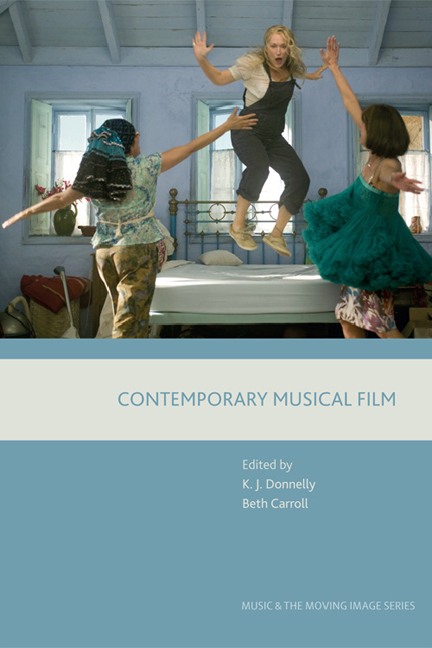Book contents
- Frontmatter
- Contents
- Illustrations
- Contributors
- Introduction: Reimagining the Contemporary Musical in the Twenty-first Century
- PART ONE ORIGINAL MUSICALS
- PART TWO STAGE TO SCREEN
- 7 Star Quality? Song, Celebrity and the Jukebox Musical in Mamma Mia!
- 8 Beyond the Barricade: Adapting Les Misérables for the Cinema
- PART THREE MUSICALS BY ANOTHER NAME
- Index
7 - Star Quality? Song, Celebrity and the Jukebox Musical in Mamma Mia!
from PART TWO - STAGE TO SCREEN
Published online by Cambridge University Press: 03 January 2018
- Frontmatter
- Contents
- Illustrations
- Contributors
- Introduction: Reimagining the Contemporary Musical in the Twenty-first Century
- PART ONE ORIGINAL MUSICALS
- PART TWO STAGE TO SCREEN
- 7 Star Quality? Song, Celebrity and the Jukebox Musical in Mamma Mia!
- 8 Beyond the Barricade: Adapting Les Misérables for the Cinema
- PART THREE MUSICALS BY ANOTHER NAME
- Index
Summary
Reviews of the 2008 film adaptation of ‘jukebox’ stage musical Mamma Mia! ranged from wild enthusiasm to outright embarrassment, with many critics expressing confusion at the film's unusual mixture of slick professionalism and cheery, improvisatory exuberance. Despite this lack of critical consensus, Mamma Mia! was a huge commercial success, performing well in US and European markets and becoming one of the highest-grossing films of all time at the UK box office. The film's success points towards its broad audience demographics, a mainstream appeal that is often partially attributed to the trio of women at its helm: screenwriter Catherine Johnson, producer Judy Craymer and director Phyllida Lloyd. But this particular understanding of authorship and appeal is of course only half the story in a film structured around the music of Swedish superstars ABBA, and with leading roles performed by recognisable A-list stars in a cinematic, and musical, environment that is often far outside their usual context.
The potential for simultaneous pleasure and discomfort engendered by the film's pedigree of musical and personal celebrity is a key way in which Mamma Mia! destabilises conventional registers of ‘quality’. It embraces ideas of performativity and literal role-play whilst also fostering the appearance of genuine and unfiltered (although sometimes uncomfortable) realism. The film intensifies the musical's oft-noted juxtaposition of artifice and transparency, using the shimmering Europop of ABBA's familiar hits as a backdrop to the ‘imperfections’ of highly personal vocal performance. Its deliberate aesthetic of enthusiastic amateurism provides a forum in which individualised modes of engagement are actively fostered: musical performance is an axis around which shifting character, star and audience subjectivities can be both constructed and celebrated.
- Type
- Chapter
- Information
- Contemporary Musical Film , pp. 107 - 122Publisher: Edinburgh University PressPrint publication year: 2017

